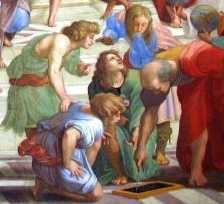One of the things that jazzes me about singing these hymns is their antiquity. Christians were singing today's hymn, composed either by Ambrose, bishop of Milan(or in the style of Ambrose), back before the printing press was invented, the fifth century.
Fr. Britt calls this hymn "Ambrosian" because of its meter: iambic dimeter (two iambs or emphasized syllables in each line). Hymn-tune scholars also classify these hymns by the number of syllables in each line. They would call this L.M. (Long Meter) or 8.8.8.8 because the hymn has four lines of 8 syllables each. [That means you could presumably sing this hymn to any tune in your hymnal that is marked "L.M." For example: O Salutaris Hostia or Jesu Dulcis Memoria are examples of hymns written in this meter. If you don't have a tune to sing today's hymn, try one of these.]
Ambrose the bishop of Milan used to write hymns in this meter to help his people remember truths of the Faith to battle the Arians. Most of the so-called Ambrosian hymns were really not written by Ambrose, they just have the same meter as all the hymns he wrote.
If you look up Ambrosian Hymnography in the online Catholic Encyclopedia, you find that scholars have classified about ninety-some hymns as Ambrosian. Out of these, the opinions vary as to how many Ambrose acutally penned: some say only four, some twelve, and some eighteen. Today's hymn appears on none of those lists, so it was probably not really written by Ambrose, just by someone who imitated his style. It's still a great hymn.
Æterna cæli glória
Eternal glory of heaven
beáta spes mortálium
blessed hope of mortals,
celsi Paréntis Unice
Only-begotten son of the Highest
castéque proles Vírginis:
the offspring of a chaste Virgin:
O CHRIST, whose glory fills the heaven,
our only hope, in mercy given;
Child of a Virgin meek and pure;
Son of the Highest evermore:
2. Da déxteram surgéntibus,
Give thy right hand to those who rise;
exsúrgat et mens sóbria
sober also may the soul arise
flagrans et in laudem Dei
and zealous in the praise of God
grates repéndat débitas.
return him due thanks.
Grant us Thine aid Thy praise to sing,
as opening days new duties bring;
that with the light our life may be
renewed and sanctified by Thee.
3. Ortus refúlget lúcifer,
The risen morning star shines forth,
ipsámque lucem núntiat,
and announces the Light Himself
cadit calígo nóctium,
the darkness of night disappears;
lux sancta nos illúminet.
may the holy light illuminate us.
The morning star fades from the sky,
the sun breaks forth; night's shadows fly:
O Thou, true Light, upon us shine:
our darkness turn to light divine.
4. Manénsque nostris sénsibus
And dwelling in our hearts
noctem repéllat saéculi
may it dispel the darkness of the world
omníque fine témporis
and till the end of time
purgáta servet péctora.
may it preserve our hearts unsullied.
Within us grant Thy light to dwell:
and from our souls dark sins expel;
Cleanse Thou our minds from stain of ill,
and with Thy peace our bosoms fill.
5. Qæsíta iam primum fides
First may faith long-sought
radícet altis sénsibus,
root itself in our nourished hearts;
secúnda spes congáudeat,
secondly, may hope rejoice us;
tunc maior exstat cáritas.
but greater still than these is charity.
To us strong faith forever give,
with joyous hope, in Thee to live;
That life's rough way may ever be
made strong and pure by charity.
6. Sit, Christe, rex piíssime,
tibi Patríque glória,
cum Spíritu Paráclito,
in sempitérna saécula. Amen.
All laud to God the Father be;
All praise, Eternal Son, to Thee;
All glory, as is ever meet,
to God the Holy Paraclete.
The interlinear English today is generally straight out of Britt, as is the metrical translation by John Julian (1839-1913). Several lines vary from the Pre-V2 version though:
line 3 in Stanza 1 used to be "Summi Tonantis Unice" or Son of the most high Thunderer.
line 2 in Stanza 3 used to be "Præitque solem nuntius" or and as a herald precedes the sun.
line 3 in Stanza 3 used to be "Cadunt tenebræ noctium" or the shadows of the night disappear
line 2 in Stanza 5 used to be "In corde radices agat" or strike deep its roots in our hearts;
line 4 in Stanza 5 had "Qua" for "tunc", which I can't see how it changes the meaning much.
3 February: St. Blaise Day and the special blessings of candles and of
throats
-
Today is the Feast of St. Blaise, about whom we know very little. We have
only this very brief entry in the Martyrologium Romanum: Sancti Blasii,
episc...
3 hours ago

No comments:
Post a Comment